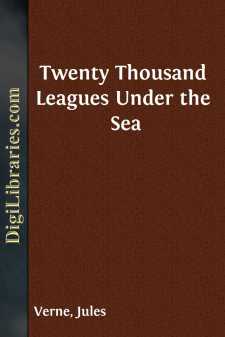Categories
- Antiques & Collectibles 13
- Architecture 36
- Art 48
- Bibles 22
- Biography & Autobiography 813
- Body, Mind & Spirit 142
- Business & Economics 28
- Children's Books 17
- Children's Fiction 14
- Computers 4
- Cooking 94
- Crafts & Hobbies 4
- Drama 346
- Education 46
- Family & Relationships 57
- Fiction 11829
- Games 19
- Gardening 17
- Health & Fitness 34
- History 1377
- House & Home 1
- Humor 147
- Juvenile Fiction 1873
- Juvenile Nonfiction 202
- Language Arts & Disciplines 88
- Law 16
- Literary Collections 686
- Literary Criticism 179
- Mathematics 13
- Medical 41
- Music 40
- Nature 179
- Non-Classifiable 1768
- Performing Arts 7
- Periodicals 1453
- Philosophy 64
- Photography 2
- Poetry 896
- Political Science 203
- Psychology 42
- Reference 154
- Religion 513
- Science 126
- Self-Help 84
- Social Science 81
- Sports & Recreation 34
- Study Aids 3
- Technology & Engineering 59
- Transportation 23
- Travel 463
- True Crime 29
Jules Verne
Jules Verne (1828-1905) was a French novelist, poet, and playwright renowned for his pioneering works in the science fiction genre. He is best known for his novels "Twenty Thousand Leagues Under the Sea," "Journey to the Center of the Earth," and "Around the World in Eighty Days," which combined adventure with futuristic technology and exploration. Verne's imaginative storytelling and detailed descriptions of advanced inventions significantly influenced both literature and modern science.
Author's Books:
Sort by:
by:
Jules Verne
The Tantrums of Ned Land I HAVE NO IDEA how long this slumber lasted; but it must have been a good while, since we were completely over our exhaustion. I was the first one to wake up. My companions weren't yet stirring and still lay in their corners like inanimate objects. I had barely gotten up from my passably hard mattress when I felt my mind clear, my brain go on the alert. So I began a...
more...
by:
Jules Verne
CHAPTER I. CHARLESTON, SEPTEMBER 27th, 1869.—It is high tide, and three o'clock in the afternoon when we leave the Battery-quay; the ebb carries us off shore, and as Captain Huntly has hoisted both main and top sails, the northerly breeze drives the "Chancellor" briskly across the bay. Fort Sumter ere long is doubled, the sweeping batteries of the mainland on our left are soon passed,...
more...
by:
Jules Verne
CHAPTER I. IN WHICH THE READER HAS THE OPPORTUNITY OF BUYING AN ISLAND IN THE PACIFIC OCEAN. "An island to sell, for cash, to the highest bidder!" said Dean Felporg, the auctioneer, standing behind his rostrum in the room where the conditions of the singular sale were being noisily discussed. "Island for sale! island for sale!" repeated in shrill tones again and again Gingrass, the...
more...
by:
Jules Verne
INTRODUCTION TO VOLUME NINE Among so many effective and artistic tales, it is difficult to give a preference to one over all the rest. Yet, certainly, even amid Verne's remarkable works, his "Off on a Comet" must be given high rank. Perhaps this story will be remembered when even "Round the World in Eighty Days" and "Michael Strogoff" have been obliterated by centuries of...
more...
by:
Jules Verne
The sun had disappeared behind the snowy peaks of the Cordilleras; but the beautiful Peruvian sky long retains, through the transparent veil of night, the reflection of his rays; the atmosphere is impregnated with a refreshing coolness, which in these burning latitudes affords freedom of breath; it is the hour in which one can live a European life, and seek without on the verandas some cooling gentle...
more...
by:
Jules Verne
Chapter I BANG! Bang! The pistol shots were almost simultaneous. A cow peacefully grazing fifty yards away received one of the bullets in her back. She had nothing to do with the quarrel all the same. Neither of the adversaries was hit. Who were these two gentlemen? We do not know, although this would be an excellent opportunity to hand down their names to posterity. All we can say is that the elder...
more...
by:
Jules Verne
Chapter 1 "Are we rising again?" "No. On the contrary." "Are we descending?" "Worse than that, captain! we are falling!" "For Heaven's sake heave out the ballast!" "There! the last sack is empty!" "Does the balloon rise?" "No!" "I hear a noise like the dashing of waves. The sea is below the car! It cannot be more than 500 feet...
more...
by:
Jules Verne
CHAPTER I. A CAPTAIN OF THE WOODS "P h y j s l y d d q f d z x g a s g z z q q e h x g k f n d r x u j u g I o c y t d x v k s b x h h u y p o h d v y r y m h u h p u y d k j o x p h e t o z l s l e t n p m v f f o v p d p a j x h y y n o j y g g a y m e q y n f u q l n m v l y f g s u z m q I z t l b q q y u g s q e u b v n r c r e d g r u z b l r m x y u h q h p z d r r g c r o h e p q x u f I v...
more...
by:
Jules Verne
CHAPTER I. HEALTHFUL HOUSE. The carte de visite received that day, June 15, 189—, by the director of the establishment of Healthful House was a very neat one, and simply bore, without escutcheon or coronet, the name: COUNT D’ARTIGAS. Below this name, in a corner of the card, the following address was written in lead pencil: “On board the schooner Ebba, anchored off New-Berne, Pamlico Sound.”...
more...
by:
Jules Verne
CHAPTER I. CLAUDIUS BOMBARNAC, Special Correspondent, “Twentieth Century.” Tiflis, Transcaucasia. Such is the address of the telegram I found on the 13th of May when I arrived at Tiflis. This is what the telegram said: “As the matters in hand will terminate on the 15th instant Claudius Bombarnac will repair to Uzun Ada, a...
more...











